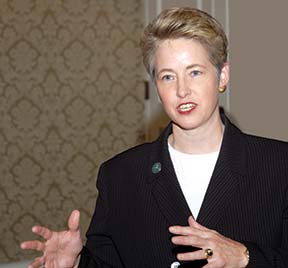
InsideOut at City Hall: First Year
In 2004, successes included voter approval of oversight authority.
By Annise D. Parker
 Happy 2005! As I look back on 2004, I’m amazed how fast the year flew by and how much was achieved during my first year as city controller.
Happy 2005! As I look back on 2004, I’m amazed how fast the year flew by and how much was achieved during my first year as city controller.
Proposition 3, my top priority for 2004, won mayoral and council support, then 85 percent voter support. The controller’s office will now have clear authority to conduct comprehensive performance audits without seeking mayoral approval.
The controller’s office audit division will have to perform these expanded duties with the same 11 employees and no increase in the $320,000 annual budget for any necessary outside auditing services. The office is already conducting a performance review of the after-school program and plans similar audits of the 311 system and the fire department’s life safety division.
Honeymoon jitters?
They’re still in love, but they’re beginning to notice each other’s flaws.
Although Mayor White’s still racking up almost unanimous votes, City Council discussion is getting more contentious. The relationship is still incredibly harmonious, though, especially compared to the open warfare at the end of the Brown administration. The upbeat mood likely will continue as long as the budget stays fairly balanced and the economy picks up.
I have enjoyed working with this can-do mayor. Considering some of the heated mayor-controller battles of the past, such as Lanier vs. Greanias, our relationship is surely one of the best in recent city history. We agree on many issues, and both the mayor and I prefer to work out issues privately rather than duke them out in the newspaper.
Financial report cards
The holiday season started early in the controller’s office this year when the big three rating agencies sent their report cards:
• Standard & Poor’s—city “outlook” boosted from stable to positive (AA-rating);
• Fitch—stable city outlook maintained (AA);
• Moody’s—stable city outlook maintained (Aa3).
This is great news. Who would have thought we would be stepping into the new year with renewed confidence, considering the financial hurdles the city faced early in 2004? These included a $2 billion pension crisis, soaring health insurance costs, and at least one property tax revenue cap proposition on the November ballot.
The rating agencies noted the city’s healthy, diversifying economy and took a wait-and-see attitude about city voters’ preference for the less-restrictive Proposition 1 over Proposition 2, both of which passed. Proposition 1, which garnered more votes than Proposition 2, will limit city property tax revenue growth to a combination of population and inflationary growth, while Proposition 2 would have limited all city revenue (including enterprise funds such as the aviation department) based on the same formula.
Although the city’s legal department has determined the city will operate only under Proposition 1, Proposition 2 supporters may take the city to court.
The rating agencies praised city government handling of pension reform while S&P lauded the city for its management of health-care costs and a “potentially fiscally crippling revenue cap.” The agencies did raise cautionary flags about possible effects of the propositions.
As the city’s chief financial officer, my office provided the mayor and council with assessments of Propositions 1 and 2 and the pension crisis. I also presented the council’s only written analysis of the complicated Hilton Americas hotel transfer, a critical component of the mayor’s pension proposal.
Still up in the air is my proposal to have the controller or a representative serve on the pension board. It’s a perfect fit with the controller’s responsibility as the city’s financial watchdog and a way to bring some independent oversight to the pension fund’s investing policies. There would be no conflict of interest because I have no vote at the council table.
Other 2004 events
HPD inspection division. The controller’s office recently trained a group of police officers to think like auditors. The training was prompted by a request from Chief Hurtt, who asked for help in establishing an HPD inspection division to provide more internal controls in the wake of the DNA lab and evidence room scandals.
Record bond deal. In June, the city suc-cessfully completed the largest and most complex bond deal in its history. The $3.1 billion restructuring of water and sewer debt will save the city more than $80 million a year. The refinancing completes the cre-ation of a new, combined utility system that includes water, sewer, and drainage services. The plan provides for up to $50 million a year for the next three years for storm water drainage maintenance and operations.
Construction delays audit. In April, the controller’s office surprised everyone by reveal-ing that the city and METRO, not private contractors, are largely responsible for those never-ending street construction projects that miss deadline after deadline. The mayor had asked the controller’s office to investigate street project delays in an unprecedented performance audit.
A year of major crises has passed. I look forward to a quiet, constructive 2005.
I thank everyone who contacted me about the four-part adoption series [August–November 2004]. I hope it proves encouraging to others contemplating adoption. If you missed a segment, you can read it in a previous issue here on the OutSmart website.
Annise Parker is city controller and the highest-ranking openly GLBT elected official in any of the 10 largest U.S. cities. Her city website is www.ci.houston.tx.us/citygovt/controller. Parker’s television program, “Money Matters,” airs Monday on the Municipal Channel (TimeWarner Cable 16) at 2 and 8 a.m. and 2 and 8 p.m.










